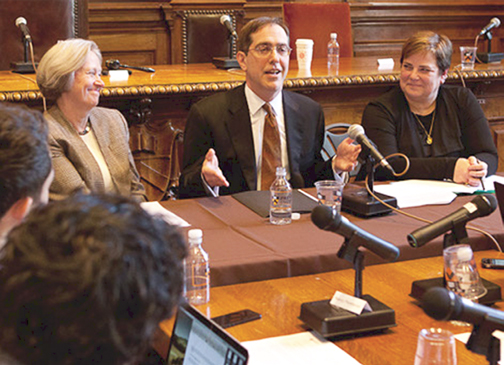Our 20th President
April 21 was a glorious day for our University, for on that day the members of the Board of Trustees elected Christopher L. Eisgruber ’83 the 20th president of Princeton. I suspect that by now readers of the PAW are familiar with the bare facts of his remarkable career — studying physics at Princeton; two years at Oxford studying political theory as a Rhodes Scholar; a brilliant sojourn at the University of Chicago Law School, where he rose to become editorin- chief of the law review; clerking for U.S. Court of Appeals Judge Patrick Higginbotham and U.S. Supreme Court Justice John Paul Stevens; and teaching at the New York University Law School before joining our faculty in 2001. It is hard to imagine a more glittering resumé for a Princeton president.
But what that resumé cannot capture are the personal qualities that will make him such a fine president. When I asked him to serve as provost in 2004, he would be the first to say that his appointment came as a surprise to both him and the campus. He had been at Princeton for only three years, and although he was directing the new Program in Law and Public Affairs, the administrative requirements were not demanding. What I saw then — and what has been amply confirmed in the nine years we have worked together — was an individual of extraordinary intelligence, sober and wise judgment, and the highest standard of integrity. I also saw someone who loved Princeton and with whom it would be great fun to work. For Chris has a fabulous and wicked sense of humor. I am planning on spending my last few weeks in office deleting the e-mails he sent to me over the years that had me laughing out loud in an empty office.
A Princeton president cannot be successful if he or she does not have a great provost. I have had the privilege of working with two of the best — Chris and President of the University of Pennsylvania Amy Gutmann — and it is a source of immense pride that both are now or soon will be presidents of Ivy League universities. With Chris I have had a true partner. While we disagreed from time to time about the best strategy to employ in order to accomplish a goal, we never disagreed about the goal or the fundamental principles and values that informed our decisions.
As often as students ask me what a president actually does, they are even more mystified by the role the provost plays. Officially, the provost is the chief academic and budget officer — the chief operating officer, to use the terminology of the business world. The provost’s job is a very demanding one because he or she must reconcile the responsibility to continually move the University forward with the limitations of a finite budget that must be balanced each year. This means that occasionally the provost must disappoint faculty, students, and staff who have terrific ideas that simply cannot be funded. I am often reminded of the late Professor of Sociology Marvin Bressler’s admonition to me that a great university administrator is someone who can say “no” to a faculty member’s request and have the faculty member leave with a smile. While no one could have a perfect record on that score, Chris has come very close to Bressler’s ideal by always taking time to explain each decision and sympathizing with those he must disappoint.
It was that instinct for transparency that Chris called upon during the Great Recession of 2008- 09 to bring Princeton through the crisis with a minimum of drama. If there is one time you do not want to be a provost, it is during a period when the endowment drops 23.4 percent in the space of six months! With Chris in the lead, the administrative team acted quickly to align our more limited resources with the University’s core needs and highest priorities, such as financial aid.
The provost is often perceived as the “insider” to the president’s “outsider” role. In the last several years that distinction has blurred as Chris has become a prominent and respected national voice on a number of key issues in higher education, including how to measure student achievement and how colleges and universities themselves should be measured for impact and effectiveness. He has also taken the lead in helping Princeton navigate the brave new world of online education, serving on Coursera’s Advisory Board. Finally, as some of you know firsthand, he has spent increasing amounts of time with alumni around the country and the globe. In short, he is ready to be president, and we are very lucky to have him at the helm.














No responses yet